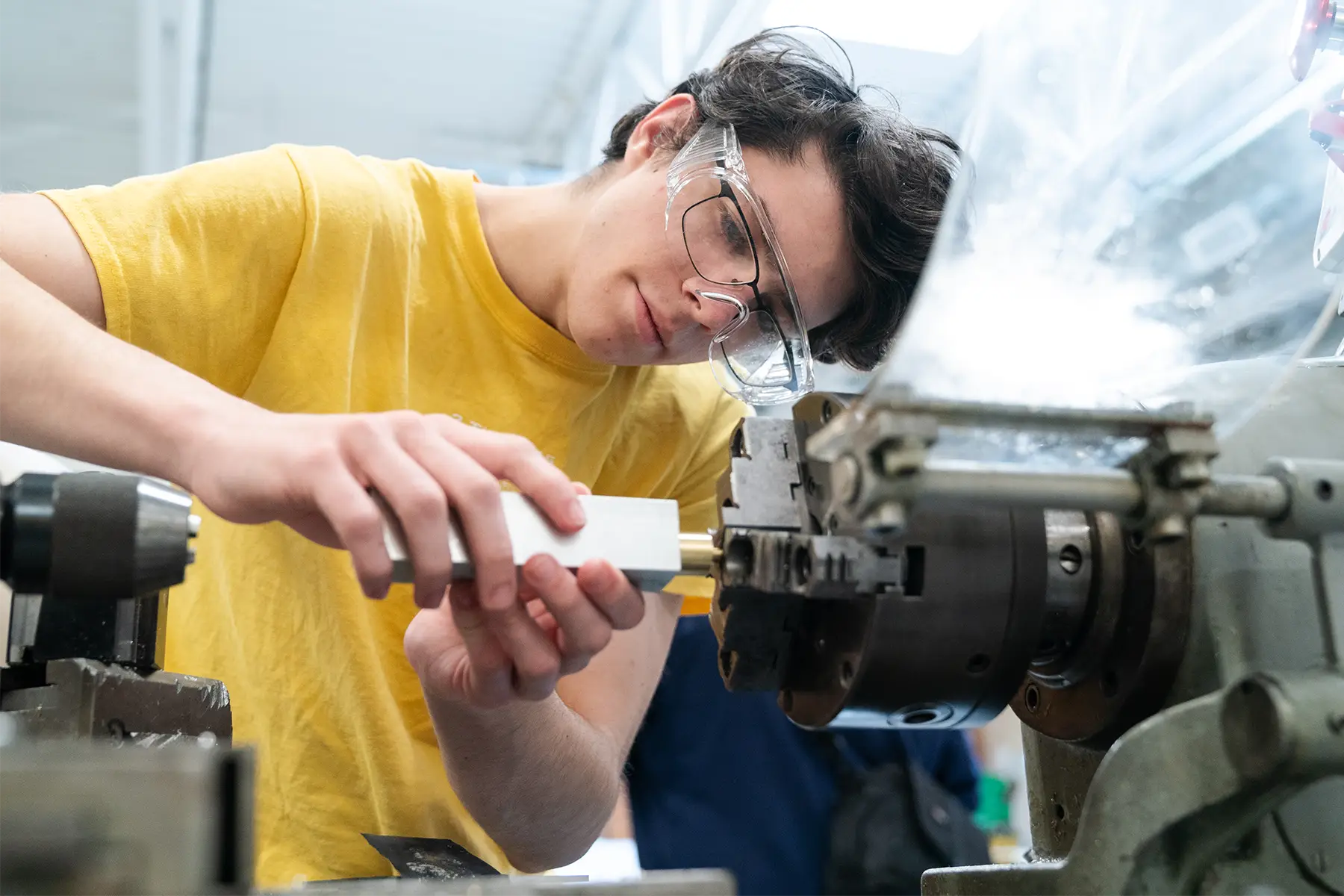At A Glance
Program Type
Bachelor of Science (BS)
Accreditation
Northwest Commission on Colleges and Universities (NWCCU), Accreditation Board for Engineering and Technology (ABET)
Biomedical Engineering, Civil Engineering, Computer Engineering, Electrical Engineering, Mechanical Engineering
Recognition
U.S. News and World Report “Best Undergraduate” engineering program
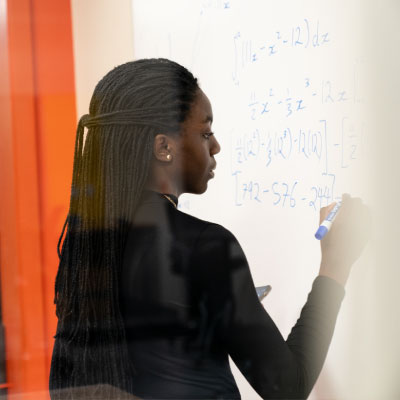
How do you want to make a difference in this world? Have you considered how a degree in engineering can serve as the launch point of fulfilling that dream?
You’ve come to the right place.
Think about the impact you can have. From artificial limbs to cell phone networks to aircraft controls, the innovation of engineers touches nearly every part of the human experience on a daily basis. At George Fox, our engineering majors build microprocessors, engines, MP3 equalizers, and much more – all while they’re still students!
But that’s only the beginning. We are equally invested in your development as a person and are all about creating engineering solutions for the underserved (check out our amazing servant engineering projects!).
- #1 Christian engineering program in the West - U.S. News (2025)
Concentrations
Biomedical Engineering
Interested in engineering applications to medicine, biology, and human health? This is the concentration for you. You’ll study tissue engineering, biomedical microelectromechanical systems, microfluidics, prosthetic engineering, biomechanics, biomaterials, bioinstrumentation, medical devices, and more.
Mechanical Engineering
One of the most diverse and versatile engineering fields, mechanical engineering uses the principles of energy, materials, and mechanics to design and manufacture machines and devices of all types and in diverse fields ranging from medicine to power.
Civil Engineering
Civil engineers conceive, design, build, supervise, operate, construct and maintain infrastructure projects and systems in the public and private sector, working on everything from roads, buildings and airports to tunnels, dams, bridges, and systems for water supply and sewage treatment.
Civil engineering is composed broadly of six main categories: structural engineering, transportation engineering, geotechnical engineering, water resources engineering, environmental engineering, and construction engineering.
Computer Engineering
This branch of engineering integrates several fields of computer science and electronic engineering required to develop computer hardware and software. Computer engineers usually have training in electronic engineering (or electrical engineering), software design, and hardware-software integration instead of only software engineering or electronic engineering.
Computer engineers are involved in many hardware and software aspects of computing, from the design of individual microcontrollers, microprocessors, personal computers, and supercomputers, to circuit design, robotics, and communications.
Electrical Engineering
This discipline is concerned with the study, design and application of equipment, devices and systems which use electricity, electronics, and electromagnetism. It is divided into a wide range of fields, including computer engineering, systems engineering, power engineering, telecommunications, radio-frequency engineering, signal processing, instrumentation, and electronics.
Many of these disciplines overlap with other engineering branches, spanning a large number of specializations, including hardware engineering, power electronics, electromagnetics and waves, microwave engineering, nanotechnology, electrochemistry, renewable energies, mechatronics, and electrical materials science.
Taking on the World’s ‘Grand Challenges’
The world is in need of engineering solutions, and we at George Fox are answering the call by taking part in the Grand Challenges Scholars Program, a National Academy of Engineering (NAE) initiative created for the purpose of casting a vision of what engineering needs to deliver to all people on the planet in the 21st century.
With 14 goals in total – ranging from providing clean water and energy to reverse engineering the brain and providing energy from fusion – the NAE Grand Challenges Scholars Program focuses student research and professional development toward accomplishing this vision over the next century.
Becoming a Grand Challenges scholar at George Fox will give you the opportunity to do impactful research, coupled with deep reflection on the responsibility and implication of being an engineer and global citizen. It ties in to our departmental desire to foster empathetic and globally minded engineers.
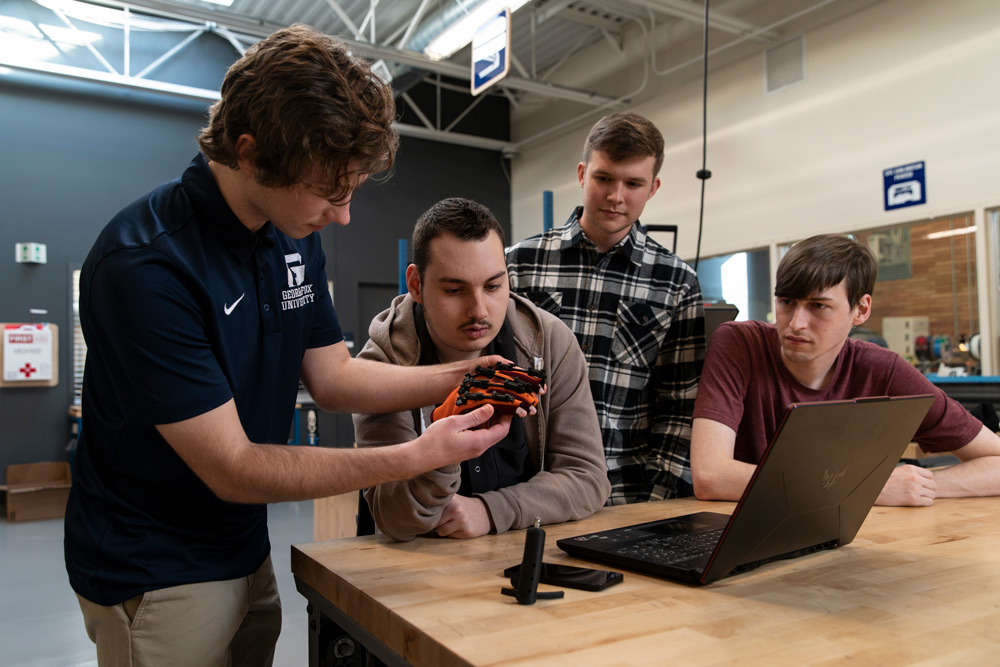
Servant Engineering: Creative Solutions for the Underserved
We take Christ's call to use our God-given gifts and abilities to serve others. To put that into practice, the Servant Engineering program is a core curricular requirement. In it, you will team up with industry professionals to research, design and deliver engineering solutions to address humanitarian needs.
All our third-year students work on interdisciplinary teams, creating solutions to significant technical challenges through a human-centered design approach.
Among our recent projects:
- Clean cook-stove technologies for meeting the basic needs of refugees, impoverished people and communities in the developing world
- Augmentative communication and physical therapy devices for patients and staff at the Providence Center for Medically Fragile Children in Portland
- Design of a bridge at a ranch for fatherless youth in Yamhill, Oregon
- An auto-resistive enhancement to an exercise bicycle for use in focused physical therapy
- Rugged wheelchair designs for individuals suffering with cerebral palsy in the slums of Nairobi, Kenya
- Creation of a prosthetic device to assist one of our own – an engineering student born with symbrachydactyly, a condition characterized by limb abnormalities
- Design of “The Bouncinator 3000,” a custom-made device that gives a young girl with physical disabilities newfound freedom
Mentorship Opportunities
Students in the engineering program have the opportunity to engage in industry mentorship through the Ignite program. As an Ignite member, you are matched with Christians in the industry. You’ll meet monthly to discover opportunities, develop connections, address career gaps, and ask questions.
Study Abroad Opportunities
Enhance your education and global perspective with two unique study abroad opportunities in partnership with international universities and local community partners. These programs allow you to live abroad while earning credits toward your engineering degree.
Take courses at The Polytechnic University of Valencia, a prestigious Spanish institution focused on science, technology, and the arts. You’ll have the opportunity to earn credits within your major while studying alongside international students in a vibrant academic setting.
Attend Kimyo University and explore Central Asia’s rapidly developing engineering landscape. This program provides a unique chance to study engineering in an international context while experiencing a country rich in cultural heritage and economic growth.
Both programs offer an excellent opportunity to expand your academic and personal horizons while tackling global engineering challenges.
Program Distinctives Why Study Engineering at George Fox?
-
You will engage in hands-on experiences in our exceptional laboratories beginning your freshman year.
-
We are one of just over a dozen institutions in the Council for Christian Colleges & Universities to offer a four-year engineering program accredited by the Engineering Accreditation Commission of ABET, and one of only three on the West Coast.
-
Interactive learning is emphasized throughout the program, regardless of your concentration.
-
Our faculty care about you as a person and will come alongside you to provide the support you need.
-
You will find an outlet for designing solutions that meet real-world needs, setting the course for a fulfilling career.
Courses / Curriculum What Will I Study?
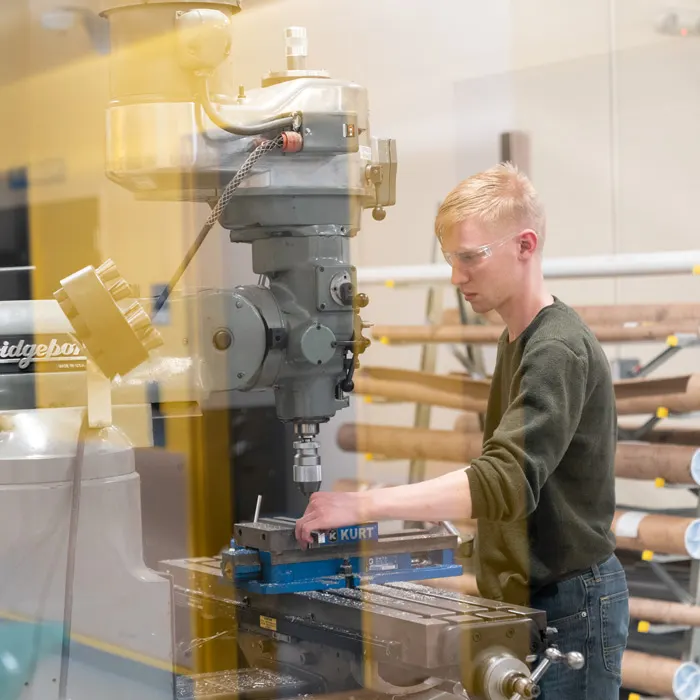
Our spaces/Where Will I Learn?
Maker Space: Where Innovative Ideas Come to Life
The facility includes:
- A 24-station computing lab
- Eight meeting rooms with 48-inch monitors
- A wood shop with a large computer numerical control (CNC) router
- A metal shop with a CNC milling machine
- And so much more
These spaces surround an open configurable collaboration space known as "the Hub," a 6,000-square-foot area used by students representing a wide range of majors. The computer labs have the processors and computer systems needed to accommodate the demands of our major.
Career Outlook What’s After George Fox
Job growth for engineers is expected to rise, according to the Bureau of Labor Statistics, due to an infrastructure that continues to age (civil engineering), the ever-increasing demand for highly skilled computer scientists, and the ability of electrical and mechanical engineers to develop and apply new technologies.
“Job prospects may be best for those who stay abreast of the most recent advances in technology,” notes the BLS.
- Electrical Failure Analysis Engineer, Intel
- Embedded Software Design Engineer, Tektronix
- Semiconductor Design Engineer, Teradyne
- Reliability Engineer, Lattice Semiconductor
- Various engineering positions, Daimler Trucks North America
- Mechanical Engineer, Puget Sound Naval Shipyard
- Applications Engineer, MCAD Technologies
- Development Engineer, Contech Engineered Solutions
- Project Engineer, Anderson Construction
- Civil Design Engineer, KPFF Consulting Engineers
- Teradyne, Portland
- CUI, Portland
- Intel, Beaverton, Oregon
- Lattice Semiconductor, Portland
- HP, Boise, Idaho
- 3D Systems, Wilsonville, Oregon
- Tektronix, Beaverton, Oregon
- Climax, Newberg, Oregon
- Cascade Steel, McMinnville, Oregon
- Biotronik, Beaverton, Oregon
- MIT (Mechanical Engineering)
- Cal Poly (Electrical Engineering)
- Johns Hopkins University (Biomedical Engineering)
- Purdue University (Mechanical Engineering, Astronautics Engineering)
- USC (Astronautical Engineering)
- Virginia Tech (Biomedical Engineering)
- CU Boulder (Electrical Engineering, Aerospace Engineering)
- Wake Forest (Biomedical Engineering)
- Montana State University (Mechanical Engineering)
- University of Oregon (Sports Product Design)
- Oregon State University (Electrical/Computer Engineering, Civil Engineering, Mechanical Engineering)
- University of Washington (Electrical/Computer Engineering, Mechanical Engineering)
- University of Rochester (Electrical Engineering)
- Georgia Institute of Technology (Computer Engineering, Mechanical Engineering)
- Michigan Tech (Mechanical Engineering)
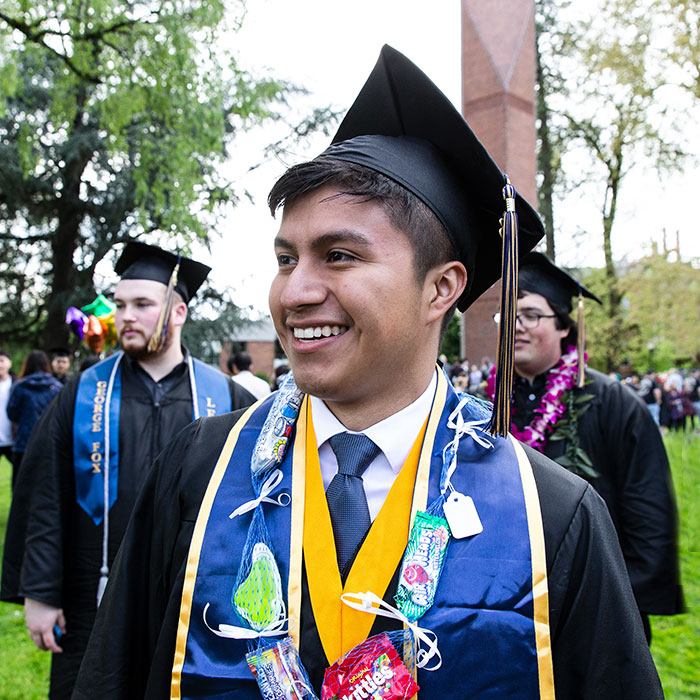
The Bouncinator 3000
Take a look at the Bouncinator 3000. Developed specifically to help Genevieve with mobility, the bouncinator was created over the course of an entire academic year by a team of five George Fox students in the university’s Servant Engineering program.

Jake Ferrier
During my time at George Fox I’ve gained a lot of resilience and trust in my ability to push through challenges. It’s been amazing to be in a place where the professors invest in me and show me by example how to use my engineering skills to serve God and my community.
Request Information About Engineering
